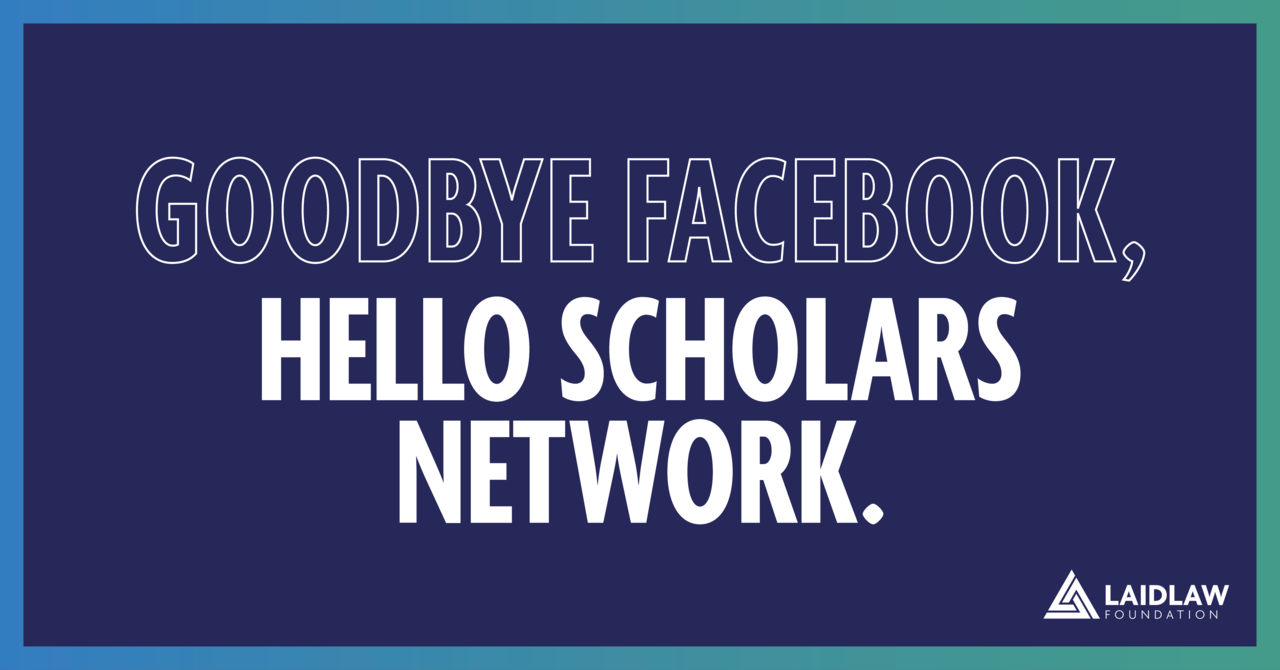#Delete Facebook

I have been thinking about deleting my account for ages. It is hard to be the CEO of a Foundation that invests in the Next Generation of leaders, has "Good" as one of its core Scholars' values and actively espouses moral leadership, to support an organisation that has presided over data hacks, misinformation, fraudulent reviews and election interference without doing anything about it. And yet I hesitated. Scared to leave where our clients are, sad to miss pictures and news from family and friends, worried about becoming out of touch.
IISSMS, I have run highly successful marketing campaigns on Facebook. At Brunswick Group, we ran a Facebook campaign promoting our thought leadership at Davos which cost peanuts and brought in substantial new business opportunities. At WGSN we ran "shameless promotion" campaigns on Facebook which boosted our new business pipeline, user traffic and client LTV. It is fantastically easy to use. Get your targeting and messaging right and you can unquestionably change behaviour; that also made me hesitate. As well as espousing moral leadership, I am borderline obsessed with marketing ROI.
Watching The Great Hack, I flip-flopped between admiration for the precision targeting and fear/greed messaging deployed by Cambridge Analytica on Facebook - and horror for, well, exactly the same things. There is much to be admired in the professional ability to identify micro communities and understand their needs and motivations. There is nothing to be admired in the deliberate manipulation, through shameless misinformation and factual-misrepresentation, of people's beliefs and behaviour.
It is also not a good look, to rail at Facebook's failings and then continue to boost their profits. The Guardian is a case in point. I understand the divide between commercial and editorial, but there are limits. As long as the Guardian is promoting content on Facebook, and driving traffic to it, it is adding to the profits of the platform of which it allegedly so vehemently disapproves. There is something so fabulously brazen about boasting that the breaking of the Cambridge Analytica scandal was a major driver in its return to profits, while continuing to advertise on Facebook, and allowing (encouraging? forcing?) its otherwise incredibly impressive Carole Cadwalladr to crowd fund for legal expenses and the funding to build a bigger team, that I can only hope no one has sat down to think about the brand implications of such blatant hypocrisy. I would hate to believe this is a conscious choice.
Facebook only survives because it has users whose profiles it can sell. We decided to remove ours, and encouraged our scholars to delete theirs too. This summer we launched a brand new community platform - the Laidlaw Scholars Network - to give Laidlaw Scholars and alumni an alternative social media space. We used Zapnito. In two short months we built and deployed the expert network, gained more followers than we had ever had on Facebook and are enjoying richer, smarter, content contributions.
Instead of going to where our scholars were we asked them to come to us. Happily, they did. They have come to a branded community platform, with a clear purpose, whose members share similar interests; where their data is safe; where they contribute, collaborate and, I hope, learn from and with each other to be better global citizens.
If you are still on Facebook, I would urge you to reconsider. Until, you, and your colleagues and your family all delete your profiles, Facebook has no incentive to do better. And they are absolutely smart enough to do so. They just need some more encouragement.






To access please sign in or register for free
If you are a registered user on Zapnito Knowledge Hub, please sign in
Great post Susanna. I deleted my Facebook account several months ago and only feel sorry I didn't do so earlier!
Good for you - me too!
Susanna I'm going to follow your advice, it's something I've been considering for a while and your post is the tipping point.
Excellent - so pleased.
I deleted my personal account years ago. Our business account is all gone now too after reading this and reflecting on how this platform fits with our values.
Bravo to this--I barely use FB and would have deleted my account long ago if I didn't need it for client stuff (social media consulting is part of my business).
I'm currently reading Christopher Wylie's book--he was one of the whistleblowers who worked with The Guardian to break the Cambridge Analytica story--and highly recommend it, as well as The Great Hack.
I have an acount on FB but never use it. I've never been on Instagram and don't intend to. WhatsApp I use but obviously with Guild we're building an ad-free alternative for businesses to use.
Something to be encouraged by is that Facebook use is declining. Instagram and WhatsApp (both owned by FB of course although most people don't know that) are growing. However younger people already see WhatsApp as for 'their parents' and tend now to be on Snap and TikTok. Neither of which FB own. So things do change quite quickly and FB-owned platforms are not necessarily set to stay dominant. (the alternatives are not necessarily any 'better' from a data/privacy point of view of course).
Yes, and to date it seems that "bad actors" have found it harder to use Instagram for behavioural manipulation. TikTok does indeed seem spectacularly lax and irresponsible. Wouldn't it be lovely if someone could come up with a consumer social media platform with integrity as you have done for business?